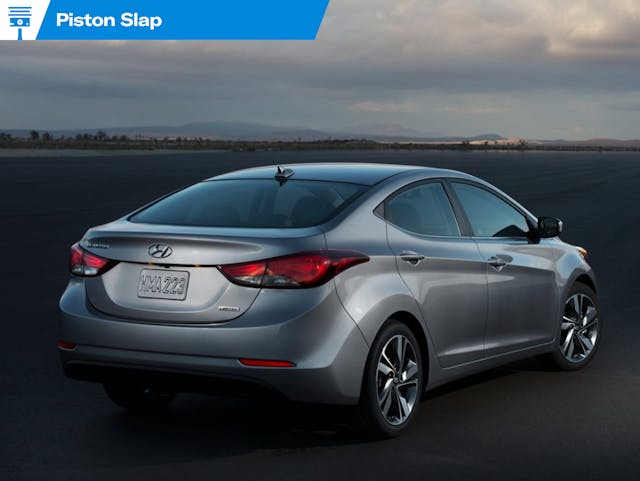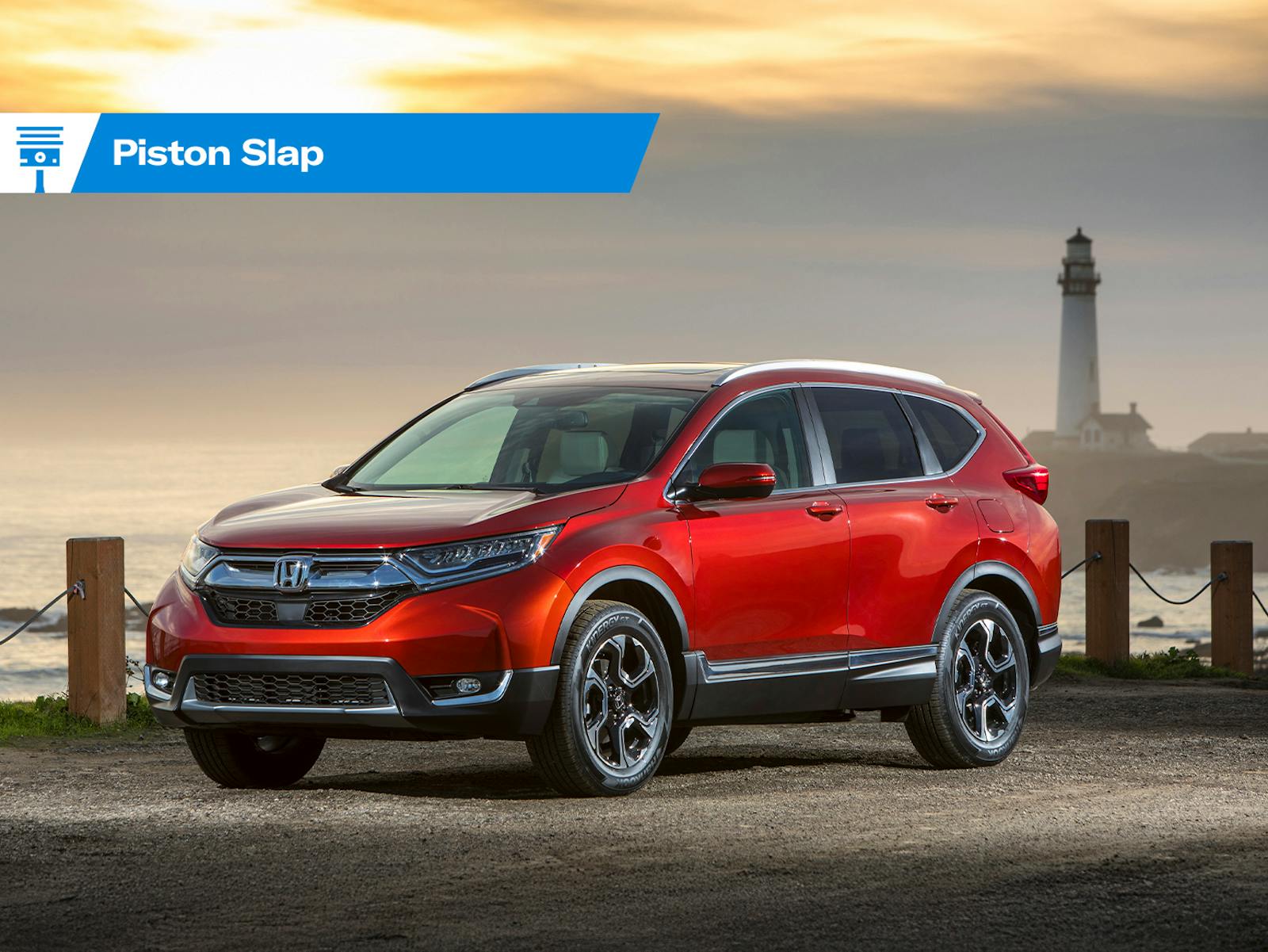Media | Articles
Piston Slap: The KSDS update, and the importance of a paper trail

K writes:
I have a 2014 Hyundai Elantra Limited (VIN provided but redacted), and it seems to have developed piston slap. I’m having trouble finding out if this car is covered by the extended warranty or any other coverage to get it fixed. I’m wondering if you may know something more about it. Thanks for your time.
Sajeev answers:
I checked your VIN on a Hyundai recall site and yours isn’t part of a formal recall for the engine. I am under the impression you have an extended warranty after performing the Knock Sensor Detection System update (KSDS), but nothing happens when I paste your VIN into that website. That’s why I always ask folks to check a local dealer to see if this can be done or was already performed.
Visit them when they aren’t busy (not early mornings, and not weekends) and forge a connection with the manager/director of service department, as he/she will help you if the motor fails. Even if our online VIN sleuthing comes up with nothing, these folks might be able to get you a new motor replacement under “goodwill” repairs. Sometimes all it takes is a friendly demeanor and proof of regular oil changes to start a paper trail in their system.
Marketplace
Buy and sell classics with confidence
K replies:
Thanks for the info Sajeev. I do have one more question. You said “proof of oil changes,” but once I purchased this car from my brother-in-law (who did get oil changes from the dealer), I started doing the oil changes myself at the same intervals as my in-law had done. So I don’t have proof of oil changes. Will it be a 100 percent no from Hyundai when they see I have no proof of my oil changes?
Sajeev answers:
That’s a good question! It really depends on the aforementioned relationship you have with the dealership’s service manager, and what they tell the regional managers at Hyundai. You can go back to the dealership that did the oil changes for your brother-in-law; maybe they will be more motivated to help you, as that car has “supported” them in the past.
If you can pull up credit card receipts showing payment for oil changes (or oil and filters from a parts store), that might help prove your point. They can also do a little exploratory surgery inside the motor to determine if oil sludge is present, so there’s good reason to remain optimistic. While you will probably have to pay for that surgery, it’s totally worth the risk to get a new engine under warranty/goodwill.
In the end, the dealership and/or Hyundai’s regional manager will be your gatekeeper, and if they don’t see signs of neglect via paperwork or visual inspections, you might be good to go … should you need a new engine.
K concludes:
Thanks Sajeev, you have been a big help. I’ll be sure to let you know what happens. Thanks again.
Have a question you’d like answered on Piston Slap? Send your queries to pistonslap@hagerty.com—give us as much detail as possible so we can help! Keep in mind this is a weekly column, so if you need an expedited answer, please tell me in your email.
***
Check out the Hagerty Media homepage so you don’t miss a single story, or better yet, bookmark it. To get our best stories delivered right to your inbox, subscribe to our newsletters.


In 2021, a family member’s 2012 Hyundai Sonata 2.4-liter Limited’s engine seized, due to the oil-starvation defect these motors have. I believe it had something to do with errant bits of metal from the machining process remaining in the block and clogging the oil passages over time. Hyundai provided her a new engine, without issue, and the dealer even gave her a loaner. They didn’t ask for any maintenance receipts.
Last year, a different family member’s 2014 Kia Soul Plus with the 2.0-liter (which we bought new) started acting funny and ultimately threw a rod. I’m not sure if it was the KSDS issue or some other extended campaign…either way, the car was still under its original powertrain warranty, so it shouldn’t have mattered. After some teeth-pulling that I think had more to do with the crappy Houston Kia dealerships than Kia Corporate, we got Kia to replace the engine (though without a loaner). They didn’t ask for maintenance receipts there, either.
I honestly would just take it in and see what they say. They may *not* ask for documentation of maintenance, especially because these problems are bad PR for them.
Many manufacturers and aftermarket vehicle service contract (extended warranty) providers don’t ask for the proof of maintenance because, when they’re requested, they’re received (real or recently created). The proof of the cause of failure is usually present in the engine.
You know how the parts store always asks you for your phone number when making purchases? Sure they are trying to sell your data like everything else out there (including your car apparently) but they are also tracking your purchases for product warranty purposes – and that tracking comes in handy. I found two old cores (I mean years old) while cleaning up in my garage one day, and I was going to throw them in the metal barrel. I decided to run them down to the parts store first. With no paperwork, they were able to find the original purchases and give me the core credits… to the tune of about a hundred bucks.
If you have been getting your oil and filter at the local parts store (instead of Wally World) they can probably provide the documentation of your purchases
Best thing to do is not buy a Hyundai. There has been a long string of major engine issues for years.
No hate for the company but when you keep getting customers in with issues it is a sign to stay away..
I rented a Hyundai with 45K on it that was all over the road because the front struts were shot. I talked to my coworker about a month later that was complaining that the struts were shot in his Hyundai at about 40K. Motors aren’t the only problem
Hyundai customer support can be hit or miss, but as Sajeev says, your relationship with the local dealer’s Service Manager is often the deciding factor. Be friendly and respectful, and clearly state your issue and hoped for resolution. Be patient, it may take several visits. Many decisions are made above the dealer level, and necessary parts can take time to arrive. It’s easy to get frustrated when you don’t get immediate results, but play the long game and stay focused on the desired end result.
I have a tough time trusting the Hyundai Theta motors in anything. Too many engine issues.
Could be tricky claiming a warranty repair on a motor that hasn’t actually failed. Noisy? “Not a failure”. They may insist it’s not a problem until it blows up but in the meantime they’re hoping it survives the warranty miles/date.
Everything I’ve seen so far suggests that Hyundai will replace the motor after it fails, because they know how bad this looks for them. I only suspect they refuse replacement if there’s no service history, signs of sludging, mileage well above the average lifespan, or a customer that’s an absolute jerk to staff at the dealer or the regional OEM level. Or a combination of those issues.
I have often wondered why anybody would buy a Hyundai/Kia. Their reputation alone would eliminate them from my shopping list.